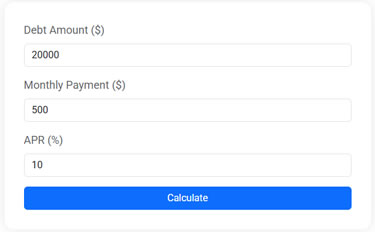Should You Use Savings to Pay Off Debt? The Pros and Cons

Deciding whether to use your savings to pay off debt involves weighing the benefits of reducing interest and improving your credit score against the risks of depleting your emergency fund and missing out on potential investment growth. It's crucial to assess interest rates, financial goals, and personal risk tolerance to determine the best course of action. Alternative strategies, like splitting funds between savings and debt or focusing on high-interest debt first, can also offer a balanced approach.
Deciding what to do with your savings can feel like a financial crossroads. On one hand, there’s a sense of security that comes with having a well-padded savings account. On the other, debt can loom over you like a dark cloud, constantly reminding you of the money you owe. It's a dilemma many of us face: should you use your savings to pay off debt, or keep that money tucked away for a rainy day?
This is a question without a one-size-fits-all answer. Each person's financial situation is unique, and what works for one person might not be the best move for another. To help navigate this tricky terrain, let's dive into the pros and cons of using your savings to pay off debt. We'll explore the potential benefits, as well as what you might be risking in the process.
The Case for Using Savings to Pay Off Debt
Paying off debt can bring a profound sense of relief, and there are several compelling reasons why you might choose to use your savings to do so. One major advantage is the potential for significant interest savings. If you're carrying high-interest debt, such as credit card balances, the interest can quickly add up and become a financial burden. By using your savings to pay down this debt, you can save money in the long run.
Reducing debt can also improve your credit score, a crucial factor when it comes to borrowing money or applying for a job that checks credit history. Lowering your credit utilization ratio—one of the key components of your credit score—can have a positive impact. As financial advisor Jane Smith often tells her clients, "A lower credit utilization rate can boost your score and open up more financial opportunities."
There's also the psychological benefit of having fewer debts hanging over your head. Debt can be stressful, and eliminating it, even partially, can provide peace of mind. For some, the emotional relief of being debt-free outweighs the comfort of having a robust savings account. Plus, the money you were using for monthly debt payments can be redirected towards other financial goals once the debt is cleared.
The Risks of Draining Your Savings
While the idea of paying off debt is appealing, using your savings to do so isn't without its risks. One of the most significant concerns is the potential lack of an emergency fund. Financial experts, including those at CNBC, generally recommend having three to six months' worth of living expenses saved for emergencies. Without this cushion, unexpected expenses, like car repairs or medical bills, could lead you to rack up more debt.
Using savings to pay off debt might also mean missing out on potential investment growth. If your savings are invested in a retirement account or a stock portfolio, the money could be working harder for you than the interest on your debt. This is particularly true if your debt carries a low interest rate, such as a mortgage or student loan. In these cases, the opportunity cost of using savings might not justify the payoff.
There's also the risk of developing a financial imbalance. As personal finance writer Emily Johnson notes, "Having savings and debt isn't unusual, but it's about finding the right balance for your financial goals." Without savings, you might feel financially vulnerable, leading to stress and anxiety about your future security.
Debt Payoff Calculator
Plan your financial future by estimating how long it will take to pay off your debt based on your balance, annual percentage rate (APR), and monthly payment. After entering your figures, the calculator determines the number of months needed to fully repay the debt and calculates the total interest paid over time.
Finding the Right Balance
So, how do you decide what's best for your financial situation? Start by assessing the interest rates on your debts versus the potential return on your savings. If your debt interest rates are significantly higher than what your savings would earn, it might make sense to pay off the debt. A thorough comparison can provide clarity on where your money is best utilized.
Consider your overall financial goals and priorities. Are you aiming to buy a house, start a business, or retire early? These goals might influence whether you prioritize savings or debt reduction. For example, if you plan to make a large purchase soon, maintaining a healthy savings account might be more beneficial.
Don't forget to factor in your personal comfort with risk. Some people are more comfortable with a lower savings balance, while others prefer the security of having a financial cushion. Your personal tolerance for risk can guide your decision-making process.
Alternative Strategies
If you're torn between paying off debt and maintaining savings, there are alternative strategies that can offer a compromise. One approach is to split your available funds between savings and debt repayment. This strategy allows you to chip away at debt while still building or maintaining your savings.
Another option is to focus on paying off high-interest debt first while making minimum payments on lower-interest obligations. This method, known as the avalanche method, can help you save more on interest over time. Meanwhile, continue to contribute to your savings, even if it's a smaller amount.
You might also consider refinancing or consolidating your debts to secure a lower interest rate. This can reduce monthly payments and the total interest paid, freeing up more money for savings. According to a report by Bankrate, "Refinancing can be a smart move if it allows you to manage your debt more effectively."
Conclusion
In the end, deciding whether to use your savings to pay off debt is a personal decision that depends on your individual circumstances and financial goals. Weigh the pros and cons, consider your comfort with risk, and explore alternative strategies. Remember, there’s no right or wrong answer—only what’s right for you. By taking a thoughtful approach, you can make a decision that supports your financial well-being and peace of mind.








